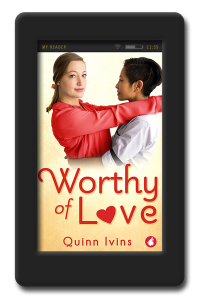The plot: Closeted political lawyer newly released from prison on a corruption charge and therefore utterly friendless and disgraced, ends up working random retail where she meets an adorable, hospitable Southern femme.
I’ve been in a huge reading slump since the lockdown started, sticking with familiar stories I already knew–to the point where there’s at least one Agatha Christie book I’ve read multiple times now in the same pandemic. Quinn Ivins’ Worthy of Love is one of the first unfamiliar books I’ve been able to get myself to read, which I attribute to two things: the exciting plot and the snappy prose. To put it baldly, the text of this book simply was not work to read. Even though the tone of the first third–specifically–was a gritty and somber hellscape, as both heroines battle hopelessness and microaggressions, I kept wanting to know how it was going to turn out all right and turned page after page of snappy narration. (And that’s unusual for me. I prefer comfort reads.)
I want to be honest that this book has sharp edges. For one thing, one of the heroines is presented right off the bat as the most hated woman in America, and the other heroine fends off sexual assault in the parking lot of her workplace. But then the more upsetting material gives way to the love story and the “solving”, and everything works out in a very complete, satisfying, and vindicating way. One of the reasons I ultimately decided to write this review was a positive plot bombshell I hesitate to telegraph–but it’s there. Another reason is one of the deftest Checkov’s Guns I’ve ever seen fired in a book. In other words, a wonderful “oh I GET HOW THIS IS GOING TO WORK OUT AS A HAPPY ENDING” that you don’t see coming until the page it happens. I tip my giant pink-grapefruit hat to the cleverness with which Ivins set that up.
One of the heroines has undiagnosed ADHD for which she begins to get treatment within the book. This, I believe, is written from the inside and elegantly rendered. The other heroine is Filipina, at the request of the author’s wife who is Filipina. This heroine does experience more microaggressions in that first third of the book than I’m comfortable with reading from a white writer, so that is also something I wanted to be up front about. However, I am white, and I don’t want to speak for Asian readers. Additionally, though this book takes place in a fictionalized America with different presidential candidates, this book will not allow you to live a “45”-free existence (although he’s got a different name and only gets mentioned a few times.) Just in case that’s something you needed to know before diving in.
I wish this book was a movie also. Now that I know how satisfyingly everything works out, I’d love to see it dramatized–and structurally, it hits dramatic “beats” like a movie. Who knows, maybe some day!
Shira Glassman is the author of Knit One Girl Two and other queer Jewish fiction, both fantasy and contemporary.

